
Latest News Regarding
Horn of Africa
Experts put forward recommendations on how to harness the power of culture for sustainable developmen
Source: EU, Press release22 September 2022, Brussels
Experts put forward recommendations on how to harness the power of culture for sustainable development
Ahead of UNESCO’s World Conference on Cultural Policies and Sustainable Development, MONDIACULT 2022, taking place in Mexico from 28 to 30 September 2022, experts have issued a new report entitled “Stormy Times. Nature and humans: Cultural courage for change”, which focuses on the important role of culture as a driver for the achievement of the Sustainable Development Goals.
Culture in all its forms, expressions and meanings, must be at the heart of any transformational path for human development. With the support from the Commission, the experts formulated a set of recommendations to rethink the relationship between humans and nature, to fuel our cultural imagination for a liveable, sustainable future.
Commissioner for Innovation, Research, Culture, Education and Youth, Mariya Gabriel, said: “Culture is the foundation of our societies. It is a catalyst that helps us question our way of life that helps us initiate the changes we want to see. I welcome this report and the work of the experts group, which will provide concrete insight on our path to a brighter, more sustainable future.”
Some proposals include, for instance, embracing the Earth Overshoot Day, the date when, each year, humanity’s demand for natural resources surpasses the Earth’s ability to renew them. Experts suggest that awareness on this particular day could be raised several times during the year, with five annual moments for sustained cultural action and cooperation.
Culture can also be a powerful tool to better communicate the available scientific knowledge on issues such as social injustice, inequalities, lack of gender equality, loss of biodiversity, lack of food security, climate change and others, addressed in the 2030 Agenda for Sustainable Development. Artists and cultural organisations should play a full part in ensuring that objectives of the European Green Deal and the sustainable development are met.
Besides, the report recommends that the cultural and creative sectors should become greener and fairer. Also, the sustainability readiness and the energy for change of the next generation of change-makers can be fully mobilised to this goal, while putting democracy, human rights and artistic freedom at its core.
These key messages are recalling some of the priorities at the centre of the Commission’s concerns and ongoing work towards the preparation of the future Work Plan for Culture 2023-2026 and, in particular, with a view to further strengthen the interplay between culture and sustainable development in EU policies and actions.
In parallel to this report, under the priority of “Culture as a driver of sustainable development” within the current Work Plan for Culture 2019-2022, the Commission is working on a report on EU initiatives and examples of culture driving sustainable development goals across several European policy areas.
In this context, as emphasised by the experts, transformation pathways led by culture, as well as re-designing cultural governance towards a more coherent policy framework, is key to achieving ambitious human development goals and making the turnaround towards sustainability.
In 2015, the 2030 Agenda for Sustainable Development echoed that culture and cultural policies are crucial to achieving at least 9 of the 17 Sustainable Development Goals (SDGs) and the transformational agenda as a whole. Nonetheless, the contribution of culture is insufficiently recognised in the framework of the 2030 Agenda, a route which this report aims to invert.
Background
The Council of the EU took an important step in May 2020, adding “Culture as a driver of sustainable development” as a priority to its 2019–2022 work plan for culture.
A group of 50 experts from 25 EU Member States, working under the Open Method of Coordination (OMC) with the support from the European Commission, examined the role of culture for sustainable development and for the attainment of the SDGs and collected good examples.
As a result, the expert group produced the report “Stormy Times. Nature and humans: Cultural courage for change” in which they formulate a set of key recommendations for policy makers, based on their findings. Their work underlines the under recognised role of culture as driver to successfully achieve the Agenda 2030.
For More Information
Work Plan for Culture 2019-2022
Print friendly pdf
The power of culture for sustainable developmentEnglish (43.526 kB – PDF)Download (43.526 kB – PDF)
Press contact
- Sonya GOSPODINOVAPhone+32 2 296 69 53Mailsonya.gospodinova@ec.europa.eu
- Flore BOUTIERPhone+32 2 296 60 43Mailflore.boutier1@ec.europa.eu
IP/22/5726Share this page
East African states on alert over Ebola in Uganda
East African states on alert over Ebola in Uganda

Source: BBC, Friday September 23, 2022
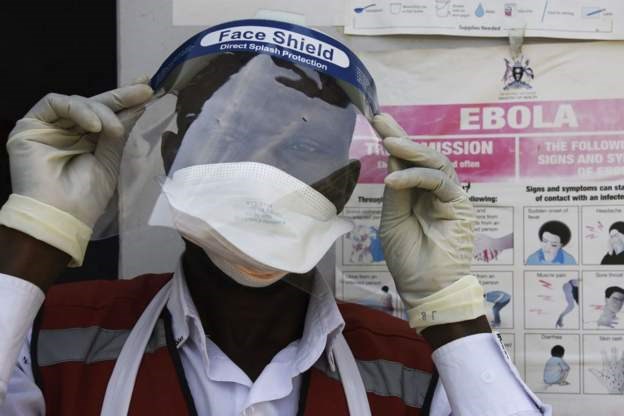
Uganda announced this week that a man had died of Ebola
East African countries have issued alerts after the announcement of an outbreak of the deadly Ebola virus in Uganda.
Neighbouring Tanzania said it had already placed surveillance teams at key entry points including airports and border points.
Health Permanent Secretary Abel Makubi told the BBC that the teams were screening all people coming to the country.
The Kenyan health ministry said it had urged county authorities, especially in border areas, to be vigilant and enhance surveillance.
It said response teams had been activated to screen people who might be at risk, including travellers and healthcare workers. It also urged the public to be highly cautious while visiting Uganda and the Democratic Republic of Congo.
In Somalia, the health ministry said it was collaborating with the Ministry of Transport and Aviation and other agencies to stop the disease from spreading into the country.
It said it was co-ordinating with the World Health Organization (WHO) to start necessary preparations and response measures, such as screening of travellers.
On Monday, Ugandan health authorities announced that a 24-year-old man had died of Ebola following a fresh outbreak in years.
The authorities are investigating whether seven other deaths were caused by the disease.
Six other cases have been confirmed on Thursday.
Panel Discussion on Biden Administration’s Africa Strategy
Panel Discussion on Biden Administration’s Africa Strategy
Source: The Philadelphia-based Foreign Policy Research Institute hosted on 20 September 2022 an hour long discussion titled “The Biden Administration’s New Africa Strategy” moderated by Charles A. Ray. The participants were Aurelia Brazeal, retired ambassador, Franklin Moore, former deputy assistant administrator for Africa at USAID, and me.
The discussion covered most aspects of the Biden administration’s policy in Africa, including areas where there needs to be more attention.
Labels: Africa, Biden administration, China, civil society, counterterrorism, democracy, economic development, energy, foreign policy, gender, private sector, Russia, security, US, youth
UN Human Rights Office Warns of Further Atrocities in Ethiopia
UN Human Rights Office Warns of Further Atrocities in Ethiopia
Source: The UN Human Rights Office published on 19 September 2022 a press release titled “UN Experts Warn of Potential for Further Atrocities Amid Resumption of Conflict in Ethiopia.”
The press release summarizes a longer report that found both the central government and Tigrayan forces committed war crimes and human rights abuses in Ethiopia. The recent resumption of hostilities threatens further atrocities.
Labels: airstrikes, Amhara Region, atrocities, drones, Ethiopia, human rights, humanitarian crisis, Oromia, Tigray Region, UNOHCHR, war crimes
Ethiopia: Tigray Alleges Eritrean Troops Cross Border and US Confirms
Ethiopia: Tigray Alleges Eritrean Troops Cross Border and US Confirms
Source: The Associated Press published on 20 September 2022 an article titled “Eritrea Accused of Starting Offensive in Ethiopia’s Tigray” by Rodney Muhumuza.
The Tigray People’s Liberation Front charged that Eritrea is deploying its entire army against neighboring Tigray Region. The United States Special Envoy for the Horn of Africa, Mike Hammer, said Washington has been tracking Eritrean troop movements across the border and condemns this development.
Labels: Abiy Ahmed, border, Eritrea, Eritrean Defense Forces, Ethiopia, Isaias Afewerki, Mike Hammer, peace process, Tigray Region, TPLF, US, war
Somali refugees flee to Kenya as drought, malnutrition cases rise
Somali refugees flee to Kenya as drought, malnutrition cases rise
Somali refugees flee to Kenya as drought, malnutrition cases rise
Source: Somaliland news & information about Somaliland and the Horn of Africa, By Chief Editor on September 21, 2022
Medical charity Médecins Sans Frontières (MSF) says caravans of undocumented migrants from Somalia are fleeing into Northern Kenya due to drought.
This comes as the Horn of Africa grapples with the worst drought in decades, malnutrition and livestock deaths from six consecutive seasons without any rainfall.
MSF said in a statement that its community outreach teams at the Dagahaley refugee camp in Kenya have witnessed an increase in new arrivals from Somalia, most claiming to have left because of the drought In July, MSF teams recorded over 300 new arrivals – likely a gross underestimate. UNHCR has said that some 4,000 people have arrived in Kenya since June 2022,” the group said.
In June, MSF warned that failing crops and rising food prices, combined with insecurity and a massive invasion of locusts that swept across the Horn of Africa, were pushing hundreds of thousands of people from rural areas to urban centres.
United States provides over $151 million in additional assistance to respond to the crisis in Somalia
United States provides over $151 million in additional assistance to respond to the crisis in Somalia
US AID
Source: US AID, Thursday September 22, 2022
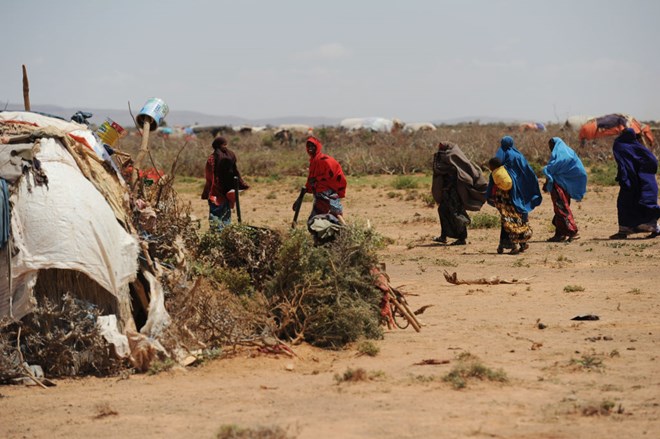
Somali families displaced by severe drought create a makeshift camp as the Horn of Africa faces severe drought on the outskirts of the village of War Idad, 150 miles east of the capital Hargeisa, Somalia, on June 19, 2017. /Getty Images
The United States, through the U.S. Agency for International Development (USAID), is providing more than $151 million in new, urgently needed assistance to the people of Somalia. $146.5 million is for food assistance, as catastrophic drought cripples the country and pushes more than 7 million people to the edge of starvation. The remaining nearly $5 million in humanitarian assistance will provide support for disaster resilience and economic recovery and market systems activities. Today’s new funding builds on another recent funding surge of $476 million in humanitarian aid in July, bringing the U.S. Government’s contribution to more than $870 million for the people of Somalia – representing more than half of all humanitarian funding for Somalia in 2022.
USAID’s critical assistance comes in response to an expert Famine Review Committee’s projection that Famine is likely to occur in Buur Hakaba and Baidoa districts of southern Somalia this year unless an urgent increase of humanitarian assistance reaches people most in need. The United States is gravely concerned by this stark forecast and by the rising level of humanitarian needs throughout the country, primarily as a result of a historically unprecedented drought marked by four back-to-back failed rainy seasons. Early projections of a fifth failed rainy season further threaten to condemn people in Somalia, who already find themselves in dire conditions, to unbearable levels of suffering.
Today’s announcement will allow USAID partner the World Food Program (WFP) to provide an additional two and a half months worth of emergency food assistance for 3.6 million people. USAID will provide cash and vouchers for Somalis to purchase food from local markets, both supporting the local economy and ensuring families facing starvation get what they need. The new assistance will support the most vulnerable families who are at immediate risk of famine, with a special emphasis on individuals who have been forced to flee their homes due to the drought.
Prior to the Famine Review Committee’s projection, USAID had already rapidly scaled up relief efforts to provide emergency assistance. This includes providing emergency food assistance to at least 3.5 million people per month, delivering vital malnutrition treatment, responding to disease outbreaks and other health needs, providing shelter and protection services, and supplying communities with safe drinking water, sanitation, and improved hygiene.
The United States government urges the international donor community to act immediately to scale up humanitarian funding for the Somali people to prevent this Famine projection from becoming reality.
Somali Government signs UPEACE Charter, opening new opportunities for Somalis
Somali Government signs UPEACE Charter, opening new opportunities for Somalis

Source: UN University, Thursday September 22, 2022
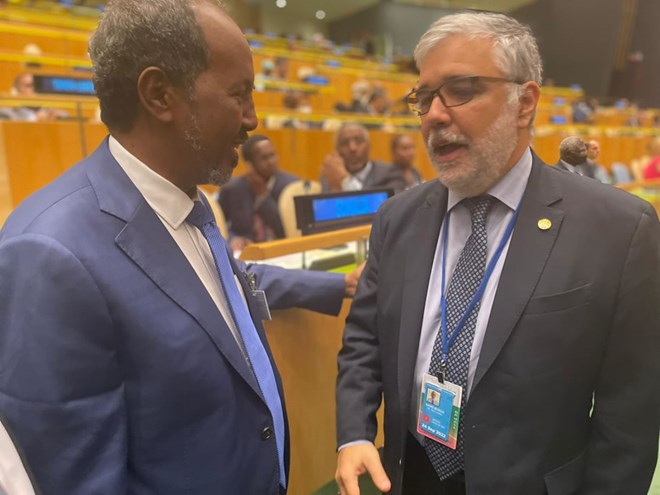
Dr Juan Carlos, Global Dean of Upeace having a chat with Somalia’s President Hassan Sheikh Mohamud at UN’s General Assembly, 20th September, 2022
Mogadishu – The UN University for peace marked another historical achievement following the signing of the instrument of accession by Somali President Dr. Hassan Sheikh Mohamud. The move means that the Somali Government has officially endorsed the UPEACE Charter and is expected to implement it.
Reacting to the news, the university’s country representative Dr. Mohamed Osman said the decision by the president is a welcome development.
“This is highly welcome news, and it puts the university’s Somalia branch at the same level with the rest of the countries that have signed the charter,” said Dr. Osman
“The students will also benefit from various scholarships offered by the institution,” added Dr. Osman.
Somalia’s President, Dr. Hassan Sheikh Mohamed, signed the instrument of accession while attending the 77th UN General Assembly, making Somalia the 42nd country to sign the charter.
The University for Peace was established in December 1980 with Headquarters in Costa Rica and Regional Programmes in Africa (Ethiopia), Europe (Netherlands), Asia (China), South East Asia (Philippines), and South America (Honduras).
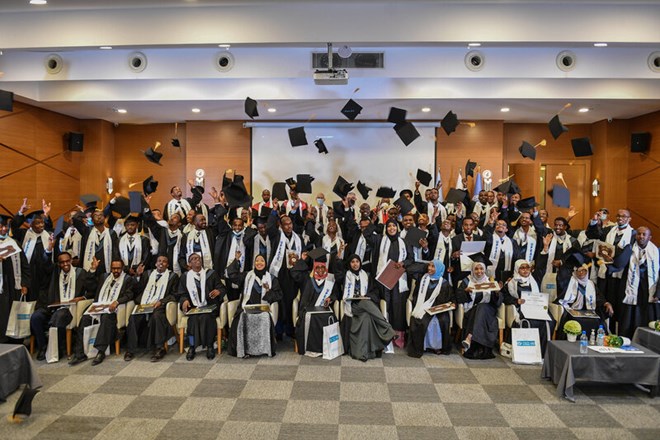
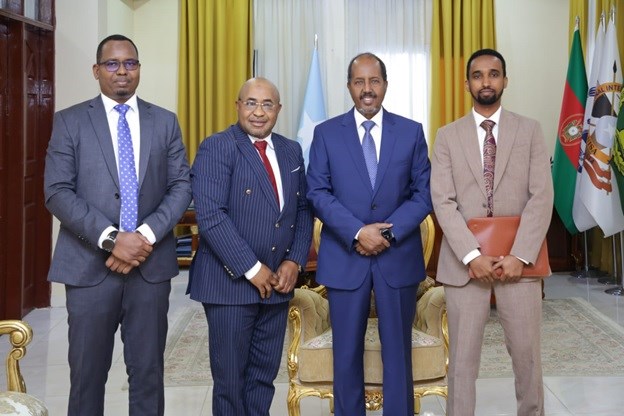
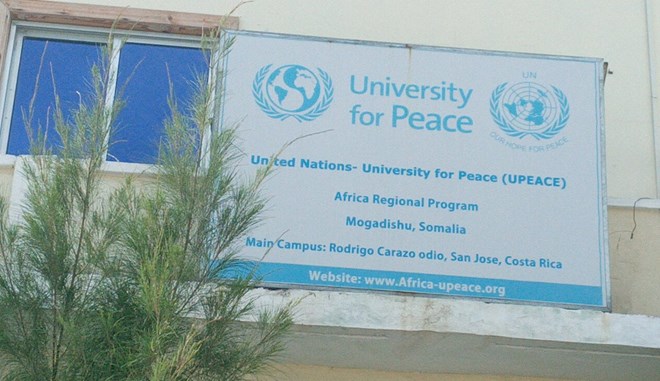
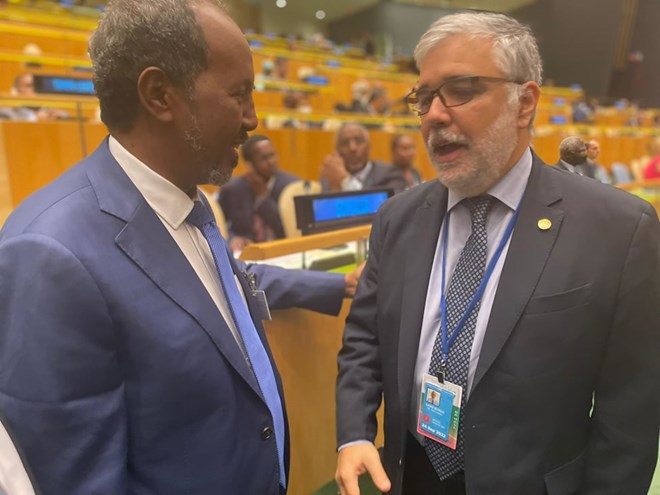
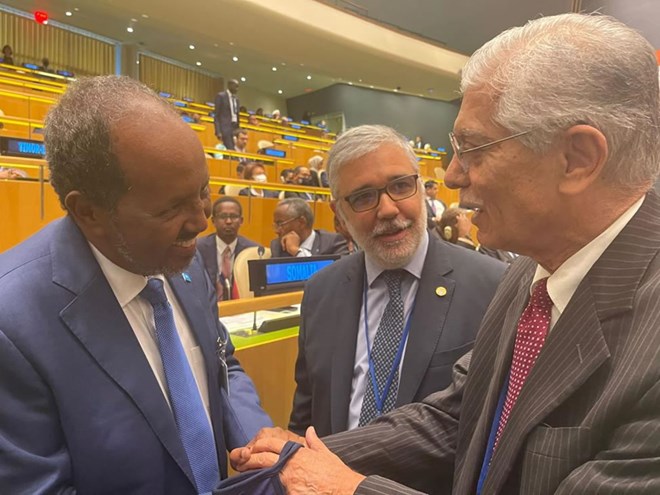

Coinciding with the International Day of Peace, a group of Somali students today graduated with master’s degrees in subjects with special relevance to peacebuilding in Somalia – and were encouraged to channel their learning towards the betterment of their country. September 21, 2021. PHOTO: UNSOMadvertisementsBefore the program was introduced to Somalia in August 2018, students would travel to the Africa Regional campus in Ethiopia or the main campus in Costa Rica to take UPeace courses.
“The signing of the UPEACE Charter by the president is yet another huge step for the university, and we hope it opens doors for expansion in Somalia and for many students to enroll in the courses offered by the university,” said Dr. Mohamed Yusuf, UPEACE Somalia Country Director.
The establishment of the university in Costa Rica played a pivotal role in establishing the first base. In Africa, the university launched its Africa Regional Programme in 2002 in Addis Ababa, Ethiopia. It opened doors to thousands of African students keen on pursuing courses related to peace, security and development.
UPEACE will be organizing its next graduation ceremony in Somalia at the end of October 2022, with more than a hundred Masters and at least ten doctoral students expected to receive their Degrees
New UN report accuses Ethiopia of Tigray atrocities
New UN report accuses Ethiopia of Tigray atrocities

Source: BBC, Tuesday September 20, 2022
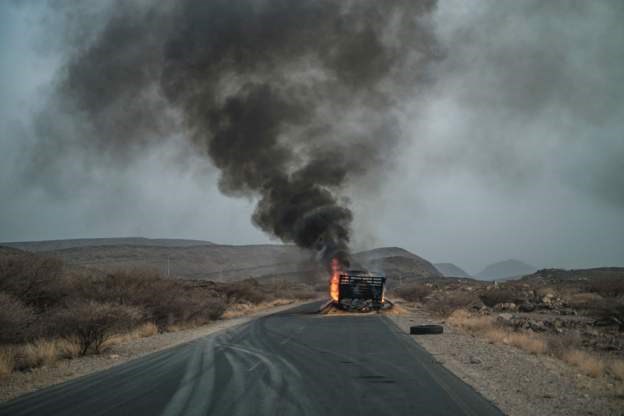
The report says human rights violations have been committed by all sides
UN investigators say they believe the Ethiopian government is behind ongoing crimes against humanity in the northern Tigray region.
In a report, the Commission of Human Rights Experts on Ethiopia highlighted what it called credible information of large-scale killings committed by Ethiopia’s national defence force, that targeted Tigrayan men and boys of fighting age.
advertisementsThe government has not responded to the allegations.
Investigators say there is also evidence that starvation is being used as a weapon of war.
The report says human rights violations have been committed by all sides since fighting erupted nearly two years ago. It describes the humanitarian crisis in Tigray as shocking.
Tigrayan authorities have welcomed the report.
A Tigrayan spokesman told the AFP news agency that they had “always maintained” that Ethiopia’s government was responsible for crimes against humanity in the region.
Investigators warn that the recent resumption of the conflict after a five-month truce increases the risk of further atrocities.
The end of the COVID-19 pandemic is in sight: WHO
The end of the COVID-19 pandemic is in sight: WHO
Source: WHO, 14 September 2022
As the number of weekly reported deaths from COVID-19 plunged to its lowest since March 2020, the head of the World Health Organization (WHO) said on Wednesday that the end of the pandemic is now in sight.
Egypt’s Foreign Minister Calls for Mediation of Grand Ethiopian Renaissance Dam
Egypt’s Foreign Minister Calls for Mediation of Grand Ethiopian Renaissance Dam
Source: Ahram Online posted on 11 September 2022 an article titled “Egypt’s FM Calls for GERD Deal as Soon as Possible in Meeting with UN Horn of Africa Envoy.”
Egypt’s foreign minister in a meeting with the UN special envoy for the Horn of Africa called on Addis Ababa to sign a binding agreement on the filling and operation of the Grand Ethiopian Renaissance Dam (GERD). He added that Egypt and Sudan want the engagement of the UN, the African Union, the United States, and the European Union to mediate the GERD talks.
Labels: AU, Blue Nile, Egypt, Ethiopia, EU, GERD, hydropower, mediation, Sudan, UN, US
Africa losing up to 15pc of GDP growth to climate change – AfDB
Africa losing up to 15pc of GDP growth to climate change – AfDB

Source: Reuters, Thursday September 15, 2022
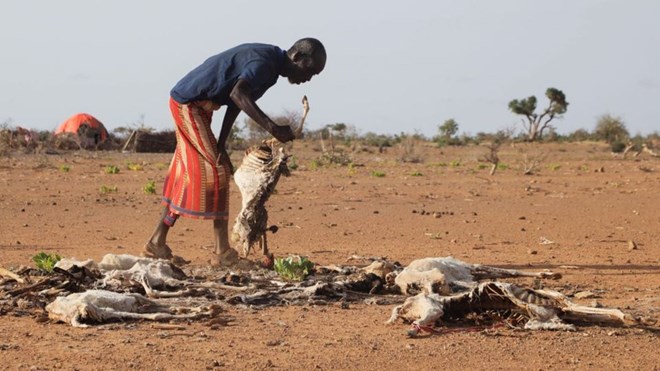
Dhicis Guray, an internally displaced Somali man, attends to the carcass of his dead livestock following severe droughts near Dollow, Gedo Region, Somalia on May 26, 2022. PHOTO | REUTERS
Africa is losing five per cent to 15 per cent of its per capita economic growth due to the effects of climate change and is facing a gaping climate finance shortfall, according to the African Development Bank (AfDB).
Africa has been hit disproportionately hard by the fallout from climate change, which has aggravated droughts, flooding and cyclones across the continent in recent years.
African nations received around $18.3 billion in climate finance between 2016 and 2019, Kevin Urama, the AfDB’s acting chief economist, said in a statement released on Tuesday.
advertisementsBut they are staring down a nearly $1.3 trillion climate finance gap for the 2020 to 2030 period.
“These sums reflect how the crisis is,” Mr Urama said. “Investing in climate adaptation in the context of sustainable development is the best way to cope with the climate change impacts.”
Rich nations promised in 2009 to deliver $100 billion in climate financing to the developing world. But that pledge has only ever been partially met and is due to expire in 2025.
African ministers meeting in Cairo last week ahead of November’s COP27 climate summit decried the lack of support which they said had resulted in the continent benefiting from less than 5.5 per cent of global climate financing.
The leaders also suggested the creation of a sustainable sovereign debt hub that could reduce the cost of capital for developing states and support debt-for-nature swaps.
Experts say there is private as well as public sector appetite for financing and investing in climate projects in Africa, but funding is hindered for reasons including risk perception, underdeveloped green finance markets, and local technical and policy constraints.
States have seen their cost of borrowing rise due to the Covid-19 pandemic and the war in Ukraine.
“Climate finance structure today is actually biased against climate-vulnerable countries. The more vulnerable you are the less climate finance you receive,” said Mr Urama.
Al Shabaab drones, and the African conundrum
Al Shabaab drones, and the African conundrum

Source: M military, Thursday September 15, 2022
by Ekene Lionel
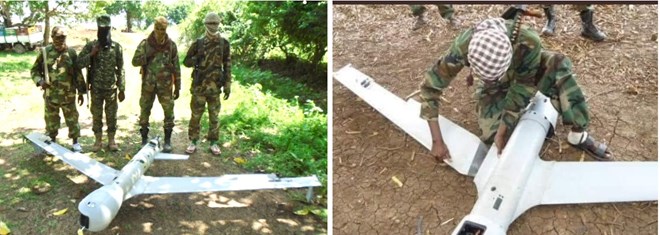
Al Shabaab fighters posing in front of a US-made ScanEagle drone
The proliferation of drone technology across Africa has significantly expanded humanitarian, and military operations, although, still an emerging technology in the continent, however, in the hands of non-state armed groups, they pose a significant threat. The combat drone was once the preserve of military superpowers but it’s now in use by insurgents and smaller nations and is already changing the nature of the battle.
Retired Colonel David Peddle, a former military service member in South Africa and the United Kingdom, with ongoing contact in Somalia, confirmed that armed nonstate actors notably Al Shabaab have been using drones for surveillance purposes, and he believes it’s only a matter of time before we start seeing the deployment of ‘clusters’ or ‘swarms’ of drones in Africa, given their accessibility and relatively low cost.
In November 2021, Somalia’s intelligence agency; the National Security and Intelligence Agency (NISA) officials intercepted 6 drones belonging to MP Zakariye, a close ally of Farmaajo and Fahad Yasin. Somali politicians and security personnel raised alarms about al Shabaab acquiring drones following the capture of six drones at Aden Adde International Airport on November 3 by the Somali National Intelligence and Security Agency (NISA).
Somali media reported the seized drones could carry more than 30 kilograms and shared similarities to attack drones used by ISIS and the Kurdistan Workers’ Party (PKK). Somali MP Zakariye Mohamud Haji Abdi imported the drones and insisted they are intended for agricultural use in Puntland despite a ban by the state on the use and importation of all drones due to security concerns.
Zakariya Mohamud Haj, said that the drones belonged to him and were used for agricultural purposes. “The drones I imported from Turkey are illegally owned by Human, a company specializing in pest control, irrigation, and all agricultural-related activities. for combating and spraying Anyaha, irrigating crops and identifying areas where rivers are vulnerable to flooding,” said MP Zakariya.”
At the time, Somali’s Opposition presidential candidates say they are worried about their safety after four out of the six drones were later declared missing from a safe house operated by NISA in Mogadishu.
Although the adaptation of commercial drones by insurgents for an aerial attack in Africa is yet to happen, there’s evidence of their use by armed groups for surveillance and precision targeting.
In 2022, Al-Shabaab media claim the group used a drone to film their daredevil 2020 attack on Manda Bay base which resulted in the deaths of US Army Spc. Henry Mayfield Jr., as well as civilian contractors Dustin Harrison and Bruce Triplett. Between 30 and 40 al-Shabab fighters launched an early morning attack on Cooperative Security Location Manda Bay.
On September 4, 2022: Alshabaab released photos of the US-made ScanEagle surveillance drone designed by Insitu. Although photographs from the group suggest that the ScanEagle drones appear not to be in flying condition, nevertheless the propaganda value is significant. The tactical utility of surveillance or commercial drones may be limited as a weapon; however, strategically they could be of use for wider intelligence gathering, collection of footage and propaganda materials and precision targeting.
The US government confirmed that Somalia’s al Shabaab militants have begun using modern technology, including drones, making their attacks on Somali government facilities even more dangerous. This was revealed by Ambassador Jeffrey DeLaurentis, Senior Advisor for Special Political Affairs, United States Mission to the United Nations (UN).
DeLaurentis made the comments during the UN Security Council Arria-Formula Meeting (informal meeting) on Transnational Activities of Terrorist Groups.
“Among new and emerging technologies, as we have heard, unmanned aerial systems (UAS) are particularly exploited by terrorist groups to facilitate attacks, conduct intelligence and develop propaganda,” he said.
The Insitu ScanEagle drones may have been stolen from Kenyan military stock. Kenya ordered five ScanEagle UAV systems under a $9.8 million FMS announced in September 2015. And in 2012, ordered eight Aerovironment RQ-11 Raven from the United States which are used to detect and monitor the Al-Shabaab movement and support the Kenyan and Somali force’s military operations.
The risk of militarization of drone technology in Africa represents a new asymmetric tool that violent nonstate groups intend to deploy to extend the reach of their coercion, reshaping the African battlefield. Once these drones are in their hands, it’s harder to control how they’re used or neutralised due to limited or in many cases non-existent counter-UAS solutions. Although Kenya does possess a limited C-UAS capability in the form of MCTECH MC-Horizon 360D Reactive anti-drone system to protect its military base scattered around the countryside in Somalia.
For instance, in the Democratic Republic of the Congo, insurgents have recently used unmanned aerial systems to locate targets for attacks. While in Mozambique, Interior Minister Amade Miquidade told a press briefing in May that the insurgents had deployed drones for precision targeting in Cabo Delgado province. This aligns with unverified reports by private security companies in the region that militants used small drones for surveillance.
As UAVs become commercially available all over the world, non-state groups in Africa with bomb-making experience and technical know-how, in general, may develop adaptions similar to what Jihadist groups have done in the Middle East over the last decade.
Ethiopia: Is Tigray Ready for African Union-led Peace Talks without Preconditions?
Ethiopia: Is Tigray Ready for African Union-led Peace Talks without Preconditions?
Source: Aljazeera published on 11 September 2022 an article titled “Ethiopia’s Tigray Rebels Say Ready for AU-led Peace Talks.”
Ethiopia’s Tigray People’s Liberation Front announced on 11 September that it is prepared to participate in peace talks with the central government led by the African Union. It is also ready to accept an immediate cease fire and made no mention of the four preconditions that it cited several days ago.
Labels: Abiy Ahmed, AU, Debretsion Gebremichael, Eritrea, Ethiopia, humanitarian aid, Mike Hammer, Moussa Faki Mahamat, Olusegun Obasanjo, peace process, Tigray Region, TPLF
Somali President meets with Kenyan President in Nairobi
Somali President meets with Kenyan President in Nairobi

Source: Hiiraan Online, Wednesday September 14, 2022
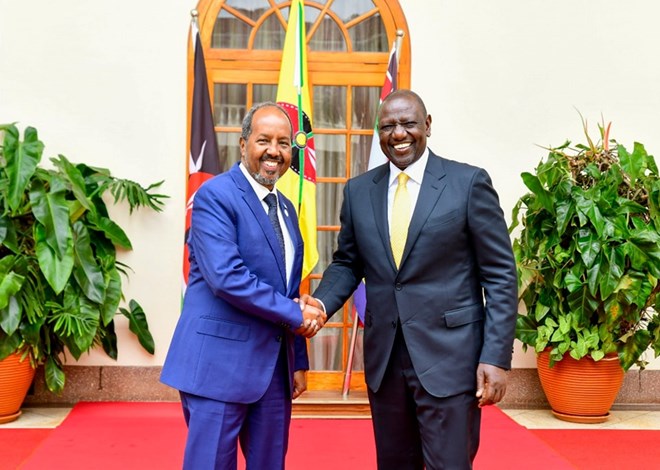
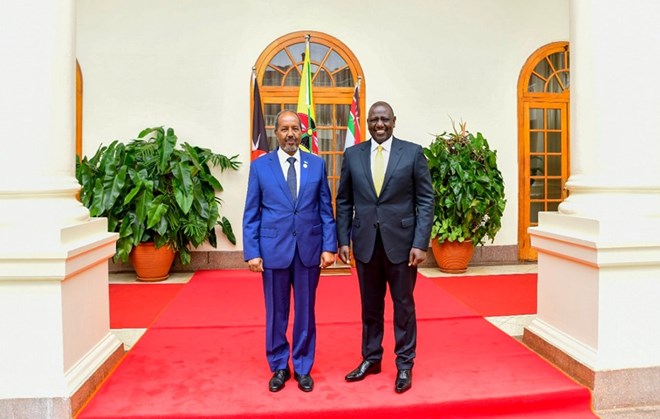
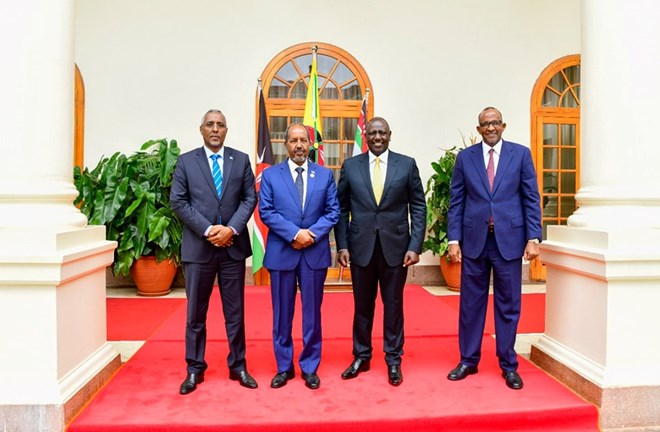
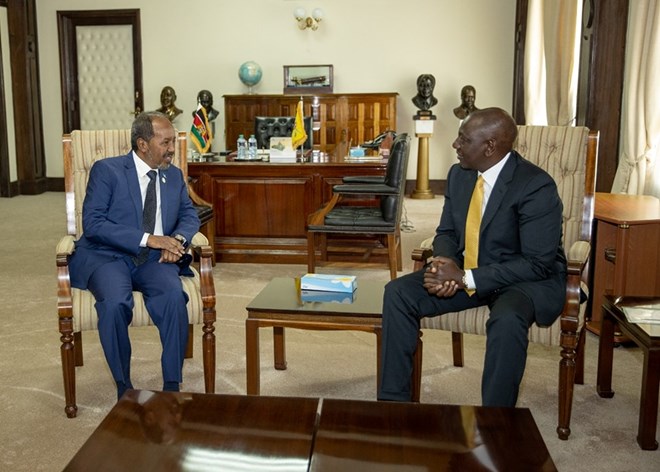
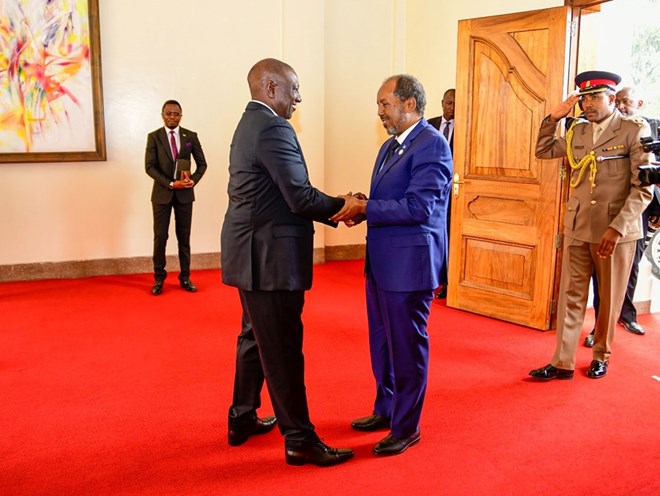
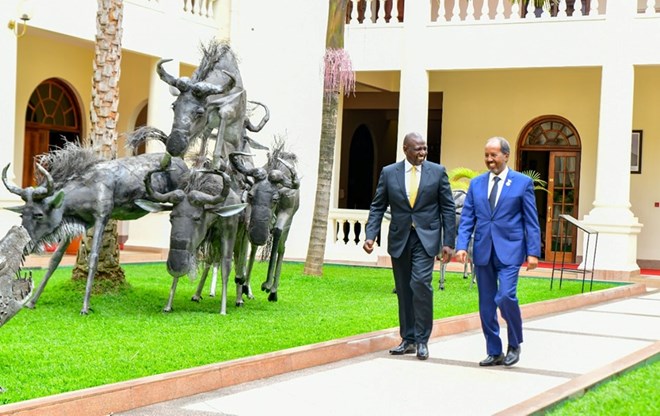

Mogadishu (HOL) – Somali President Hassan Sheikh Mohamud, and his Kenyan counterpart, William Samoei Ruto, held a meeting at the State House in Nairobi on Wednesday.
The two Presidents discussed the strengthening relations between the two countries, security situation in Somalia, and cooperation between the two neighbouring peoples.
advertisementsPresident Mohamud congratulated Kenya’s new President, William Ruto, on his inauguration and assumption of office, emphasizing that the Federal Government of Somalia was committed to full cooperation with all regional countries.
William Ruto said that they will fast-track the implementation of the Joint Commission for Cooperation between Kenya and Somalia that will boost trade in Miraa and fish and ease movement between the two nations.
Somali President Hassan Sheikh Mohamud was among more than 20 African leaders and international delegates who attended the inauguration ceremony of Kenyan President William Ruto at Kasarani Stadium in Nairobi on Tuesday.
Thousands protest military coup in Sudan as demonstrations continue
Thousands protest military coup in Sudan as demonstrations continue

Source: The New Arab Staff & Agencies
Wednesday September 14, 2022
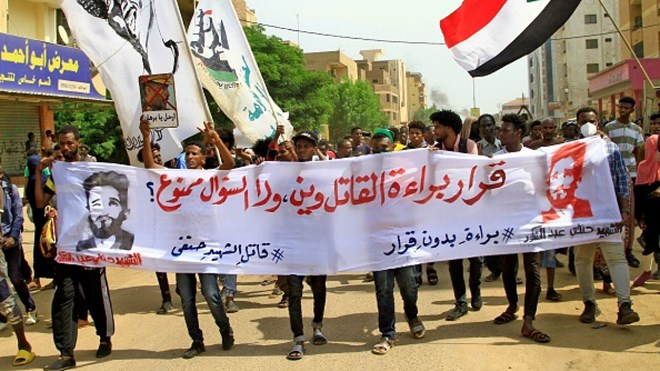
Demonstrators at Tuesday’s rally in the capital Khartoum called for the military to “go back to the barracks” [Getty]
Thousands of Sudanese protesters took to the streets Tuesday to press demands for a return to civilian rule following a military coup last year, AFP correspondents said.
Sudan has been rocked by waves of demonstrations since the armed forces led by General Abdel Fattah al-Burhan grabbed power in October.
The takeover upended a transition to civilian rule that was launched after the 2019 ouster of Omar al-Bashir, following three decades of authoritarianism.
advertisementsDemonstrators at Tuesday’s rally in the capital Khartoum called for the military to “go back to the barracks”, according to AFP correspondents.
They also carried posters of some of the 116 people that pro-democracy medics say have been killed in a crackdown on the anti-coup protests.
Some bore a portrait of Burhan with a cross sign and a caption telling him to “leave”.
In July, Burhan pledged in a televised address to step aside and make way for Sudanese factions to agree on a civilian government.
Civilian leaders dismissed the move as a “ruse”, and pro-democracy protesters have maintained their rallying cry of “no negotiation, no partnership” with the military.
Economic hardship deepened in already impoverished Sudan following the coup which triggered cuts to crucial international aid.
Government employees, traders, labourers and medics among others have been increasingly critical of the rising cost of living and low wages.
In June, the UN said a record 15 million people in Sudan – around one-third of the population – were facing “acute food insecurity” and warned the situation was likely to get worse.
The Swedish electoral system
Today 11 September 2022 Swedish national election
The Swedish electoral system
Last updated: 19 8 2021About Sweden – an orientation about Swedish society.Print
This text is about the Swedish electoral system. It is through elections that the population can influence policymaking in Sweden.

The text includes descriptions of the elections held in Sweden, who can vote in them and how you go about voting. It also talks about who can become a politician and who governs Sweden today.
Elections every four years
In Sweden, everyone can participate in making decisions. That is the foundation of democracy. Every four years, there are elections in Sweden. We cast our vote for the party we think has the best policy. The parties we vote into office are then the ones that govern Sweden for us. Our opinions are therefore important for how Sweden is going to be run.
There are different parties we can vote for. These parties are represented by politicians. The different parties often have different ideas and proposals for how the country should be run. For instance, politicians decide how much a bus ticket is going to cost, how much we have to pay in taxes, and how schools should work. Politics and policy are about issues that affect us every day.
Several elections
Four general elections are held in Sweden:
- Elections to the municipal assembly
- Elections to the regional assembly
- Elections to the Riksdag
- Elections to the European Parliament
The politicians in the Riksdag make decisions about things that affect the entire country. Politicians in the regions and the municipalities make decisions about things in the areas where we live. The politicians in the European Parliament make decisions about things that affect the entire EU.
Political parties
When you vote, you choose a party to cast your vote for. Sometimes you may feel that many parties say the same things. For instance, all parties want better medical care and schools. But parties can have different approaches to how medical care and schools should be improved. This is partly because the parties have different ideologies. An ideology is a set of ideas about what society should look like and how it should be governed. There are many different ideologies. Long-established ideologies include conservatism, liberalism, socialism, and communism. There are also more recent ideologies, such as feminism and environmentalism.
A political party is a group of people who put themselves forward as candidates in elections in order to gain influence over issues they find important. Parties usually have a membership of people with similar ideas about how they want to influence the country. However, there are no special requirements for what a political party should be. The Swedish constitution contains no definition of what a party is – it only states that the seats in the Riksdag are to be distributed among the parties that have announced that they are candidates in the election.
You might not share all the ideas of a particular party. You have to choose which issues you think are most important. You vote for the party you think has the most sensible programme of policies. In a democracy, it is important to have different political parties, as this gives voters various alternatives to vote for.
Political parties in Sweden are usually categorised along a left-to-right scale. This scale illustrates such things as how much tax the parties think we should pay, or how big a role the state should have in society. There are also parties that are not clearly to the left or right and are instead regarded as belonging to the political centre.
Photo: Melker Dahlstrand/the Swedish Riksdag
Proportional representation
Elections in Sweden are based on what is known as proportional representation. This means that a party that gets about twenty per cent of the votes is given about twenty per cent of the seats in the Riksdag. There are a total of 349 seats in the Riksdag.
The parties that get the most votes in the election to the Riksdag also get the most seats in the Riksdag. It is common for parties to collaborate with each other, or form coalitions, in order to create a majority and thus be able to get their political proposals passed by the Riksdag.
Small parties are not given seats in the Riksdag
All parties cannot have seats in the Riksdag. In order to be able to get seats in the Riksdag, a party has to get at least four per cent of the votes in the election to the Riksdag. This rule exists to make it easier for the parties in the Riksdag to reach agreement. If there were too many small parties in the Riksdag, it would be more difficult to collaborate and form coalitions.
The rules are a bit different in regional and municipal elections – in these it is easier for smaller parties to get elected to the assemblies.
Which parties are currently in the Riksdag?
During the current electoral period, the following parties are represented in the Riksdag.
The number in parenthesis shows what percentage of the votes the party got in the 2018 election to the Riksdag.
- The Centre Party (C) – 31 seats (8.61 %)
- The Christian Democrats (KD) – 22 seats (6.32 %)
- The Liberals (L) – 20 seats (5.49 %)
- The Green Party (MP) – 16 seats (4.41 %)
- The Moderate Party (M) – 70 seats (19.84 %)
- The Social Democrats (S) – 100 seats (28.26 %)
- The Sweden Democrats (SD) – 62 seats (17.53 %)
- The Left Party (V) – 28 seats (8.00 %)
If you would like to learn more about the policy programmes of the parties in the Swedish Riksdag, you can check out the parties’ own websites.
The Swedish political parties represented in the Riksdag, with the number of seats each has. Source: The Swedish Riksdag, retrieved 2021-06-14.
Links to websites of the parties represented in the Riksdag:
Read more about the Centre Party on Centerpartiet’s website.Read more about the Christian Democrats on Kristdemokraterna’s website.Read more about the Liberals on Liberalerna’s website.Read more about the Green Party on Miljöpartiet’s website.Read more about the Moderate Party on Moderaterna’s website.Read more about the Social Democratic Party on Socialdemokraterna’s website.Read more about the Sweden Democrats on Sverigedemokraterna’s website.Read more about the Left Party on Vänsterpartiet’s website.
Referendums
Sometimes, politicians turn directly to the people to reach a decision on a particular issue. This is known as a referendum. Referendums are usually only consultative, which means that the politicians do not have to decide in accordance with the outcome of the referendum. But it is a good way of finding out what the people think. In 2003, Sweden held a referendum on whether to join the eurozone group of EU countries. What the vote was about was whether we should replace the Swedish krona (SEK) with the euro (EUR). A majority of the Swedish people voted no. The politicians listened and Sweden kept the Swedish krona as its currency.
Referendums can also be held in a municipality or a region in which case they are called municipal referendums.
Who can vote?
You can vote in the election to the Riksdag if you are a Swedish citizen and at least 18 years old. You also have to have been registered as a resident in Sweden at some point.
You can vote in municipal and regional elections if you are 18 and have been registered as a resident in Sweden for at least three years. In other words, you do not have to be a Swedish citizen to vote in municipal and regional elections. If you are a citizen of another EU member state or of Iceland or Norway, you don not need to have been registered as a resident in Sweden for three years in order to be allowed to vote in municipal and regional elections.
You can vote in elections to the European Parliament if you are 18 and a citizen of an EU member state and are registered as a resident in Sweden.
How do you cast your vote?
Elections in Sweden are held on the second Sunday of September, every four years. Three elections are held on the same day: to the Riksdag and to the regional and municipal assemblies.
If you are entitled to vote, a voting card will be sent to your home address before the election. The voting card says which polling station you have to go to in order to cast your vote. The polling station might be in a school near where you live, for instance. You have to show your ID card, passport or driving licence before you cast your vote.
In the polling station, there will be ballot papers for the various parties. You pick your ballot papers and put them in an envelope. The ballot papers come in three different colours: the yellow ones are used for the election to the Riksdag, while the blue ones are used for the election to the regional assembly and the white ones for the election to the municipal assembly. If you want to, you can cast your vote for a particular politician. To do so, you put a tick or cross in front of that politician’s name on the ballot paper.
Which party or parties you vote for is a private matter, and you do not have to tell anyone if you do not want to. At the polling station, you go behind a screen when you put the ballot papers in the envelope. The electoral workers in the polling station have no way of knowing which party or parties you voted for.
You can also vote before election day. This is known as early voting and begins 18 days before election day. There are polling stations for early voting all over the country.
Voting in EU elections
Voting in EU elections works in the same way as voting in the election to the Riksdag. EU elections are held every five years. Since it is a single election, the ballot papers are all the same colour: white.
Participation in elections
By voting in elections, all of us who live in Sweden can have an influence on Swedish politics. It is a way of changing things we think are unfair or things we think do not work well. If people do not vote, it may be because they do not trust the politicians, and that may be a sign that democracy is not working well.
Many people choose to vote in Sweden. In the 2018 election to the Riksdag, 87 per cent of Swedes voted. That is a high turnout, or participation in an election, compared with many other countries.
There are differences in voter turnout between different groups in Sweden. Turnout is lower among people with a low income and a low level of education and among people who were born outside of Sweden. Reasons for this may include that not everyone knows what their voting rights are in elections or that they do not think their vote has any significance.
But every vote affects the outcome of the elections. In the last election to the Riksdag, there were almost a million people who did not vote. That is almost a million votes, which together could have had an influence on Swedish politics.
Who can become a politician?
The same rules apply if you want to become a politician as for who can vote in elections. For instance, if you have lived in Sweden for at least three years, you can be a candidate in elections to the municipal assembly.
You can also get involved with a political party without having any political office. By becoming a member of a party, you can influence policy. If you do not like any of the parties, you can become involved in a social movement or in another association. You can write letters to the editors of newspapers, call in to different radio shows, or even start a political party of your own.
Who are the elected representatives?
The people we have voted into office in elections have to represent the people and the opinions they hold. There are certain groups that are under-represented among the elected representatives. Under-representation means that the share of politicians with a certain background is lower than the share of the general population with the same background.
For example, Sweden’s Riksdag has relatively few members who are over 65 years of age, when compared with the share of the Swedish population that is over 65. The Riksdag also has relatively few members born abroad, when compared with the share of the Swedish population that was born abroad.
But there are almost as many women as men in the Swedish Riksdag. This is quite unusual. In many countries there are many more men among governing politicians. Despite the even distribution between men and women in the Riksdag, Sweden has only had one female prime minister. Before Magdalena Andersson became prime minister in 2021, every prime minister had been a man. Sweden’s first prime minister took office in 1876. Having an influence in Sweden
Migration Report for East Africa and the Horn
Migration Report for East Africa and the Horn
Source: The International Organization for Migration posted in August 2022 a report entitled “A Region on the Move 2021: East and Horn of Africa.”
The report discusses the main humanitarian situations, with a focus on internal displacement and mixed migration flows along the major migration corridors of the region. It explores mobility dynamics affecting East Africa and the Horn by providing a regional overview of data and trends on international migrants to discussing specific groups of migrants, namely migrant workers, refugees, asylum seekers, internally displaced persons and irregular migrants along the main migratory corridors.
Labels: climate change, conflict, COVID-19, Djibouti, drought, Eritrea, Ethiopia, floods, humanitarian aid, IDPs, Kenya, migration, refugees, remittances, Somalia, South Sudan, Sudan, Tanzania, Uganda
President Biden Extends National Emergency with Respect to Ethiopia
President Biden Extends National Emergency with Respect to Ethiopia
Source: The White House on 9 September 2022 issued an executive order in the name of President Joseph Biden that extends for one year the national emergency with respect to Ethiopia. The executive order concludes that the situation in northern Ethiopia “continues to pose an unusual and extraordinary threat to the national security and foreign policy of the United States.”
Labels: Biden administration, Ethiopia, human rights, humanitarian crisis, national emergency, peace, security, Tigray Region, US, violence
Ethiopia: Tigray Calls for Conditional Truce
Source: Agence France Presse published on 9 September 2022 an article titled “Ethiopia Rebels Call for Conditional Truce.”
Head of the Tigray People’s Liberation Front, Debretsion Gebremichael, sent a letter to the UN Secretary General on 7 September calling for a conditional cease fire that includes “unfettered humanitarian access” to Tigray, restoration of essential services, the withdrawal of Eritrean forces from Ethiopia, and withdrawal of troops from western Tigray. There has not yet been a public response from the central government.
Labels: Abiy Ahmed, Amhara Region, cease fire, Debretsion Gebremichael, Eritrean Defense Forces, Ethiopia, ethnic cleansing, humanitarian access, Mike Hammer, Tigray Region, TPLF
